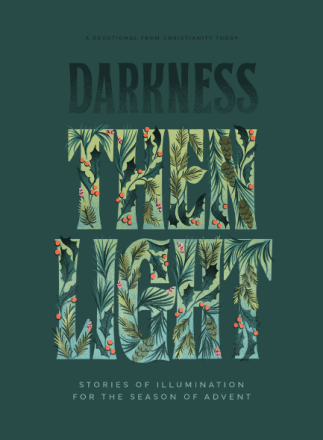The opening salvo of the biblical narrative exemplifies a truth that runs through the entirety of the unfolding drama: Light will overcome the darkness.
Open the pages of our sacred book and you are at once introduced to the beautiful theme of illumination. Out of nothing, God calls forth the cosmos with its trillions of burning stars, moons, and celestial lights illuminating what was dark before he spoke. Creation inaugurates an economy of light in which darkness will not have the final word, and this theme remains steady as the story unfolds.
We see light overcoming the darkness when God is present with his people as a pillar of fire illuminating the way in the night (Ex. 13:21–22). In the Psalms, we see that both God and his Word illuminate, as the psalmist declares, “The Lord is my light and my salvation—whom shall I fear?” (27:1) and “Your word is a lamp for my feet, a light on my path” (119:105). In the New Covenant, the theme of light is advanced as John writes about the incarnate Christ: “In him was life, and that life was the light of all mankind. The light shines in the darkness, and the darkness has not overcome it” (John 1:4–5). Even those who follow this incarnate, illuminating Christ are called “the light of the world” (Matt. 5:14–16).
These are but a handful of passages in which God emphasizes the power of light over darkness. All this illuminating beauty—from the burning stars to the light of God’s Word—is glorious news, but the good news of God’s light does not stop there. These instances of God’s illuminating work are all “out there.” There is a distance to them. God’s breathing burning stars into existence is wonderful beyond description, but many times illumination is most needed not “out there” but rather “in here.”
For many of us, a darkness lingers in the crevasse of our souls, showing itself as a crippling feedback loop of self-degradation. It’s a chorus, sung on repeat, from my innermost being that reminds me of my brokenness, my unworthiness, and, most often, my being unlovable. For many of us, the gospel is a true, present, and even gorgeous reality that we have no problem believing on behalf of others. I believe that no one is beyond the reach of the gospel’s cleansing power. I believe that God not only loves you but even likes you. I believe that, in Christ, you are not an unwanted stepchild but an adopted and cherished son or daughter with bold access to your Father, who will never turn you away. And often, I can believe these realities for you, but the darkness inside makes it difficult to see how any of them can be true for me. This is not humility; it’s a perverse inward humiliation in which I sometimes feel as though darkness may have the final word in my self-talk and self-hatred.
Yet God’s illuminating work is not confined to the cosmos— as big as it may be. Though it can be a fight to believe at times, God illuminates not only the sky with burning stars in creation but also those dark corners of our souls. In the darkness-expelling beauty of the gospel, we hear the promise of 1 John 3:20 that even when “our heart condemns us, God is greater than our heart, and he knows everything” (ESV).
The illuminating work of God can be like fireworks that light up the sky and give light to all who look up. But for each of us with a dreadful inner voice, at times the illuminating gospel is more importantly a surgeon, taking the scalpel of Christ’s life, death, and victorious resurrection to the inward darkness, the crevasses of the soul. Places we thought were unredeemable, unlovable, and maybe unfindable, God goes even there in his illuminating work of bringing resurrection where there was death.
Ronnie Kurtz is an assistant professor of systematic theology at Midwestern Baptist Theological Seminary. He is the author of several books, including Fruitful Theology: How the Life of the Mind Leads to the Life of the Soul and Light Unapproachable: Divine Incomprehensibility and the Task of Theology.













